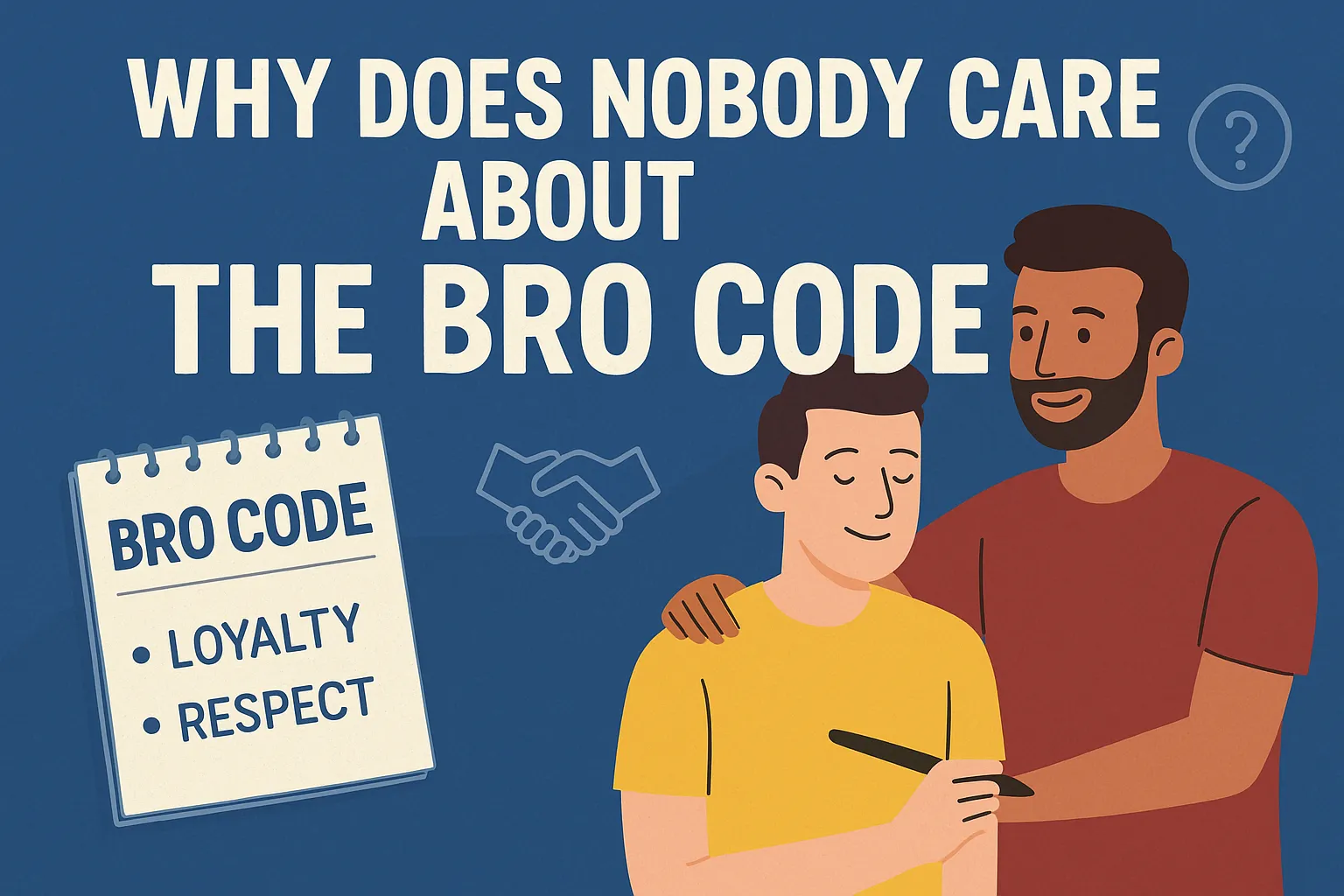Table of Contents
The “Bro Code” is an informal set of rules that outline the unwritten expectations and behavior between close male friends. It’s about loyalty, trust, and respect—a way of ensuring that men support each other through thick and thin.
Popularized by TV shows like How I Met Your Mother, the concept of the Bro Code has been part of pop culture for years. However, despite its portrayal in movies and media, many people don’t seem to care about it as much anymore.
But why is that the case? Why does it seem like the Bro Code is no longer something people abide by, or even care about? In this blog, we’ll explore the reasons why the Bro Code seems to be losing its influence and what has changed in modern friendships and society that contributes to this shift.
What is the Bro Code?
Before delving into why people might not care about it anymore, let’s quickly define the Bro Code. The Bro Code is a collection of unwritten rules, often expressed humorously, that govern the relationship between male friends. Common elements include:
- Loyalty: Always have your bro’s back.
- Respect for Relationships: Don’t date your bro’s ex or cause drama in their relationship.
- Confidentiality: Keep your bro’s secrets and never betray his trust.
- Support: Always support your bro, no matter the situation.
The Bro Code, as a concept, emphasizes trust, respect, and camaraderie in male friendships. But despite its value in maintaining strong bonds, many people now question whether it still holds relevance in today’s world.
Read also: Why Was Hitler Rejected from Art School?
Why Don’t People Care About the Bro Code Anymore?
Changing Social Norms and Gender Roles
In today’s modern society, gender roles and expectations are evolving. The traditional notion of what it means to be a “bro” or a “man” is shifting, and so is the idea of the Bro Code.
Many men today feel less pressure to live up to rigid definitions of masculinity, and as a result, the old rules that came with the Bro Code can feel outdated.
In past generations, the Bro Code was a way of reinforcing masculine solidarity, but today’s more progressive views on emotional intelligence and gender equality might challenge this traditional idea of men bonding strictly in a competitive or exclusive manner. As a result, the perceived importance of the Bro Code in modern friendships may diminish.
The Rise of Individualism
Modern society has seen a shift towards individualism, where personal goals, self-expression, and independence are highly valued. This growing individualism has led many people to focus more on their personal lives and desires rather than adhering to a set of codes or rules that emphasize group loyalty and self-sacrifice.
In a world where social media and online communities often play a central role in friendships, people are more likely to focus on themselves rather than on maintaining a rigid code with friends.
The instant gratification of online interactions might also make it easier for people to forget the deeper bonds that the Bro Code aims to foster.
Friendships Are Becoming More Fluid
Another reason people might not care about the Bro Code is that modern friendships have become much more fluid. Social groups today are often less defined, with many people moving between different groups of friends, acquaintances, and work relationships. Traditional “bro” friendships may not hold the same weight as they did in previous generations.
People are now more likely to have casual friendships or acquaintances that don’t follow the same depth of commitment as traditional friendships. In these relationships, the strict rules of the Bro Code might not apply, especially when individuals are not as emotionally or deeply invested in one another’s lives.
Romantic Relationships Taking Priority
In the past, male friendships often served as a safe space for emotional support and loyalty. Today, however, romantic relationships can take up much of a person’s time and energy, leaving less room for traditional “bro” bonds.
The rise of dating apps, commitment to romantic partners, and societal changes in how people view relationships can sometimes lead to friends becoming less of a priority.
Many individuals now focus more on nurturing romantic relationships rather than adhering to the Bro Code, especially when it comes to dating exes or balancing time between romantic and platonic relationships.
The “Bro Code” May Feel Too Restrictive
The Bro Code, as portrayed in media, is sometimes seen as rigid and restrictive. Some people feel that the rules within it don’t allow for much flexibility or personal growth. For example, the rule that prohibits dating a friend’s ex can be problematic, especially if the ex is someone the individual genuinely connects with.
In this sense, some may feel that adhering strictly to these “codes” can hinder individual freedom or happiness.
Additionally, many modern friendships are based on mutual understanding and respect without the need for a codified set of rules.
As a result, some people reject the Bro Code because it can feel outdated or overly formulaic, not leaving enough room for personal choices or the complexities of modern relationships.
Lack of Accountability in Modern Friendships
Accountability is another important factor to consider. In traditional male friendships, accountability for each other’s behavior was a big part of the Bro Code. But with the rise of social media and virtual friendships, the accountability that was once present in close-knit friend groups is weakening.
This can lead to a lack of responsibility for one another’s actions, resulting in people caring less about adhering to the Bro Code.
Friendships are becoming less about accountability and more about mutual enjoyment or convenience, which means the emphasis on loyalty and commitment might not hold the same significance in modern social circles.
Does the Bro Code Still Matter?
Despite the shifts in society and relationships, the Bro Code isn’t entirely irrelevant. While it may no longer hold the same weight it did in the past, many people still cherish the principles of loyalty, trust, and mutual support in their friendships.
It’s just that these values are now often maintained without the strict, almost comedic, rules of the Bro Code.
For many, the underlying spirit of the Bro Code—having each other’s backs, being trustworthy, and respecting one another—is still very much alive, even if it’s no longer a formal or enforced “code.” It might not be as explicitly stated or written down, but the essence of true friendship remains at the core of modern relationships.
Conclusion: Is the Bro Code Dead?
The Bro Code, as an official set of rules governing male friendships, may be less significant in today’s society, but its underlying principles still hold. With changing social dynamics, evolving gender norms, and the rise of digital friendships, people have moved beyond the rigid constraints of the Bro Code.
However, the idea of loyalty, respect, and mutual support among friends is timeless.
In the end, whether or not you follow the “Bro Code” explicitly, what truly matters is the quality of your friendships and how you treat those who matter to you. Loyalty, trust, and support should always be at the heart of any friendship, even if there’s no official code to govern it.

